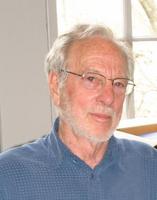Charles H. Kahn (1928-2023)
Charles H. Kahn, professor emeritus of philosophy at the University of Pennsylvania, has died.
The memorial notice, below, was provided by Michael Weisberg, chair of the Department of Philosophy at Penn.

Charles H. Kahn (1928-2023)
Charles H. Kahn, one of the most important historians of philosophy in the last century, has passed away at the age of 94. Kahn’s books and articles on ancient Greek philosophy, particularly on the Presocratics and Plato, are landmarks in philosophical and classical scholarship.
Born in Louisiana, United States of America, in 1928, Kahn enrolled in the University of Chicago at the age of sixteen, where he completed his Bachelor’s and Master’s degrees. After further study at the Sorbonne, he completed his doctorate in classical studies at Columbia University, then served as Assistant and Associate Professor of Classics at Columbia from 1958 to 1965. He was appointed Professor of Philosophy at the University of Pennsylvania in 1965, where he remained until his retirement in 2012. In addition to serving as chairman of that Philosophy Department, he held visiting appointments at other major universities, including Harvard, Cambridge, and Oxford.
As a leading scholar in his field, Charles Kahn served as editor or on the editorial board of several philosophical journals, as President of the Society for Ancient Greek Philosophy (1976-8), as Vice President of the American Philosophical Society (1997), and was elected a Fellow of the American Academy of Arts and Sciences (2000). His many honors include major research grants from the American Council of Learned Societies (1963/4 and 1984/5), the National Endowment for the Humanities (1974/75 and 1990/91), and the Guggenheim Foundation (1979/80).
While he wrote widely in ancient Greek philosophy, his focus was especially on Presocratics in the early decades of his career and on Plato in later decades. His doctoral dissertation, which was published as a book, Anaximander and the Origins of Greek Cosmology (Columbia University Press 1960), was a groundbreaking contribution to the study of pre-Socratic philosophy and is still unsurpassed today. His other books on the Presocratics include The Art and Thought of Heraclitus: An edition of the fragments with translation and commentary (Cambridge University Press 1979), still widely admired among literary and philosophical scholars, and Pythagoras and the Pythagoreans. A Brief History (Hackett, 2001), which was aimed at a wider audience.
In 1973 Kahn published the monumental work, The Verb “Be” in Ancient Greek (Reidel, Dordrecht), in which he systematically studied all the uses of the verb “to be” in ancient Greek literature from Homer onwards, discovering uses and subtle nuances that had escaped the attention of scholars. The book continues to have a significant impact on our understanding of ancient Greek language and philosophy. It provoked numerous debates and responses over the years. In 2009, Oxford University Press published a collection of Kahn’s articles in reply to those responses, in a volume entitled Essays on Being.
Kahn’s enormous contribution to the study of Plato’s philosophy lies particularly in two important books. Plato and the Socratic Dialogue (Cambridge University Press 1996) and Plato and the Post-Socratic Dialogue: Return to the Philosophy of Nature (Cambridge University Press 2013). The first in particular was very widely discussed and provided both a trenchant critique, as well as compelling alternative, to a dominant paradigm in Platonic interpretation. Its enormous impact on Platonic studies made Charles Kahn one of the most important contemporary Platonists, along with the late Gregory Vlastos.
Charles is survived by his wife, sister, four daughters, son, and ten grandchildren.


Thank you Dr Kahn for your gifts
Thank you for trying to improve us all.
I chose to do my graduate study at Penn because of Charles Kahn. Knowing my great interest in the Socrates of the early Platonic dialogues, he suggested I explore Epictetus for my dissertation. He was such an excellent mentor to me and deeply shaped my career. I remember him very fondly.
Charles Kahn taught me how to read Plato. I was a somewhat aimless philosophy grad student at the time. I was trying to finish my dissertation – but I wasn’t interested in an academic career (and made the mistake of telling my profs that). Charles was happily indifferent to my professional goals, and inclined to encourage my interest in studying carpentry after finishing the degree. But he loved reading Plato, even more than I did. And he took it seriously – in the way that passionate love takes its object seriously. He inspired the same devotion and focus in me.
That priceless gift, which he gave so freely – it’s still part of who I am. I still read Plato regularly; I think of Charles Kahn every time I do. I remember his effortless, delighted way with the Greek text – which now seems of another era, only to be aspired to, never matched. And I remember the uncanny sense I had of his communing with that ancient mind, long dead to us but not to Charles.
“But in heaven perhaps, a pattern is laid up for the man who wants to see and found a city within himself, based on the one he sees.” Republic 592a10-b5. Truly, Charles lived in the view of that pattern, and built that city within himself.
Charles Kahn was an amazing mentor, whose written work continues to inspire. Just today, before learning of his passing, I was reading his “The Thesis of Parmenides” in preparation for covering Parmenides’ poem in my next Ancient Philosophy class. It crossed my mind to write to thank him for all that I learned from him in graduate school and beyond, but apparently it is too late for any thanks other than continuing to keep his ideas alive by teaching them.